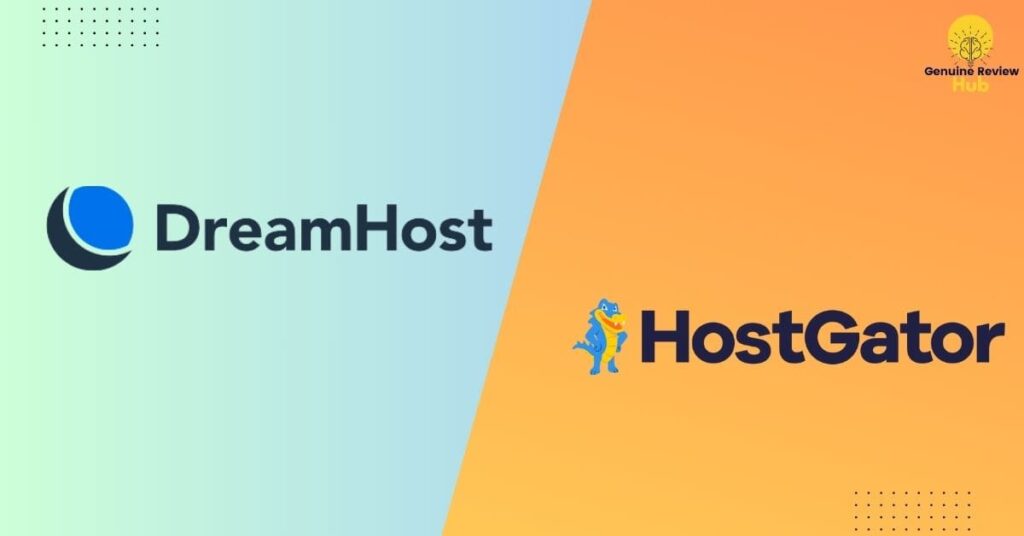When comparing DreamHost vs. HostGator, it’s essential to consider your specific website needs. DreamHost excels in performance, security, and customer support, making it a top choice for businesses and individuals with demanding websites. On the other hand, HostGator offers more affordable plans and is user-friendly, making it a suitable option for beginners and smaller websites. Ultimately, your choice between the two will depend on your priorities and budget. Read on to explore the detailed comparison and make an informed decision.
Table of Contents
DreamHost vs. HostGator: Pricing Comparison
When it comes to web hosting, cost is often a critical factor. If you’re considering DreamHost and HostGator as your potential hosting providers, you’ll want to understand how their pricing structures compare. In this article, we’ll break down the pricing of both services, so you can make an informed decision.
DreamHost Pricing:
DreamHost offers a variety of hosting plans to suit different needs. Here’s a quick overview of their shared hosting pricing:
Shared Starter: This plan starts at $2.59 per month and is suitable for beginners and small websites. It includes a free domain, unlimited traffic, and a website builder.
Shared Unlimited: Priced at $3.95 per month, this plan offers unlimited websites, storage, and email. It’s a great choice for growing websites.
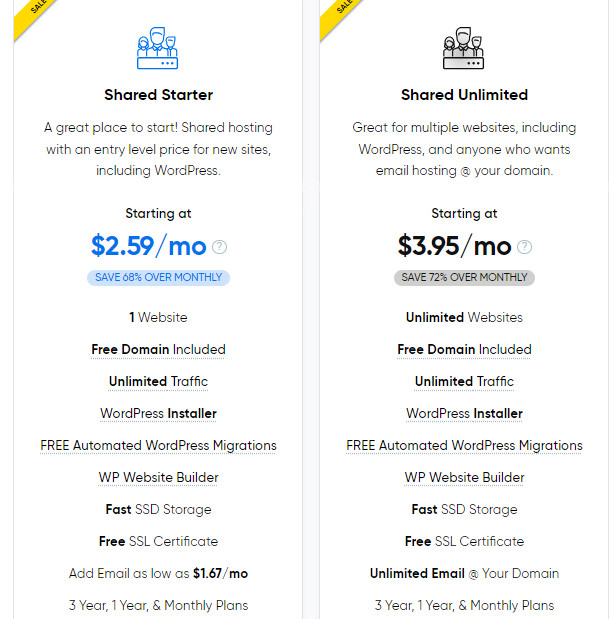
VPS Hosting: DreamHost’s VPS plans start at $10 per month, providing more power and resources for your site.
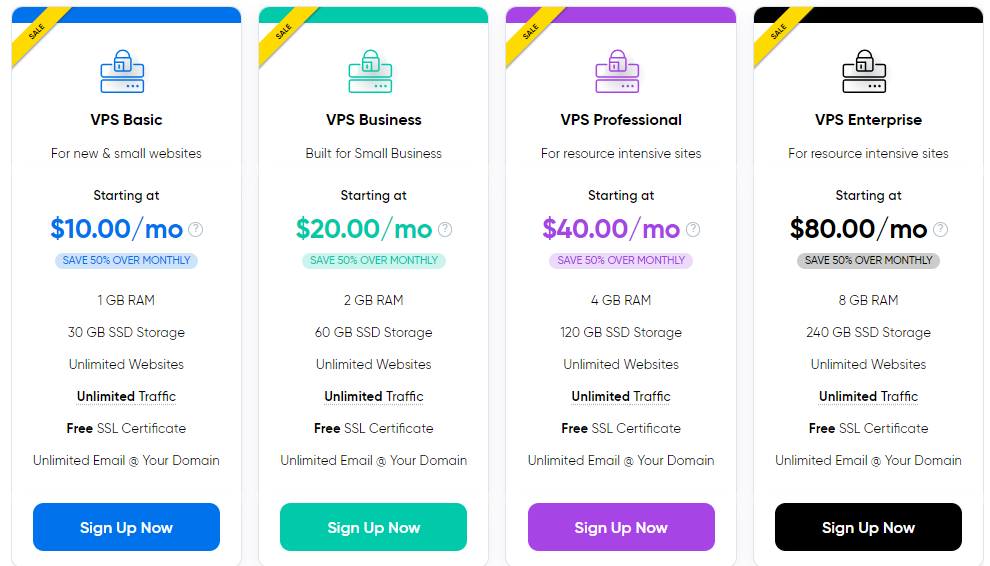
Dedicated Hosting: For those with high-traffic and resource-intensive websites, dedicated hosting plans are available starting at $149 per month.
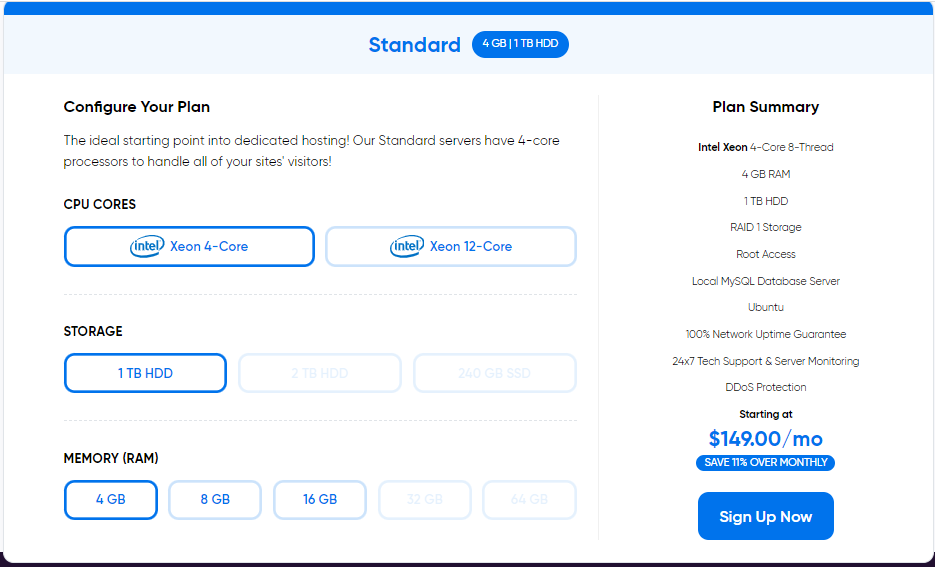
WordPress Hosting: If you’re specifically looking for WordPress hosting, DreamHost offers Managed WordPress plans starting at $2.59 per month.
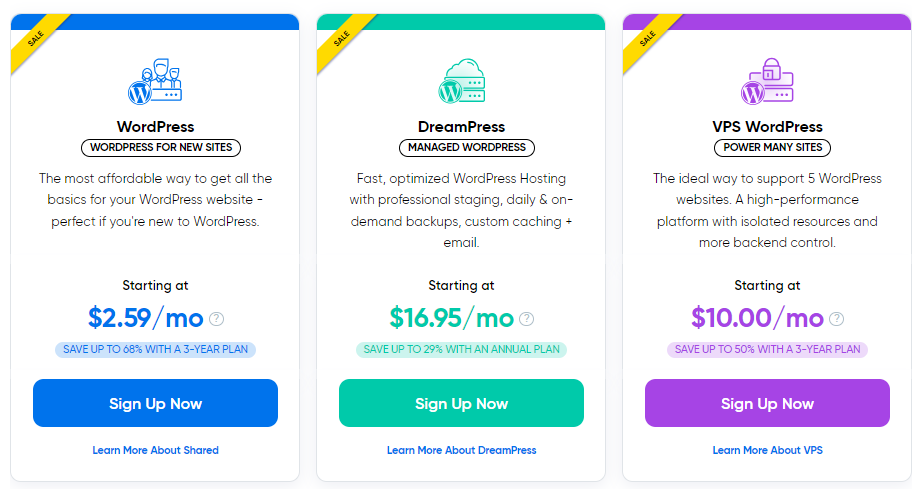
DreamHost also provides a 97-day money-back guarantee, giving you ample time to test their services risk-free.
HostGator Pricing:
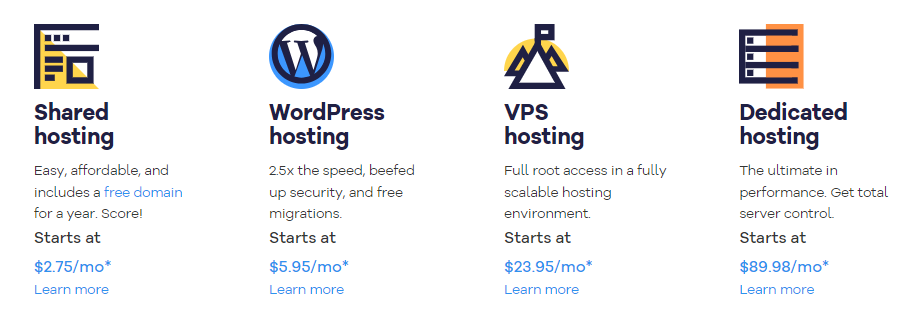
HostGator is known for its budget-friendly hosting plans. Here’s an overview of their shared hosting pricing:
Shared Hosting Plan: Starting at $2.75 per month, this plan allows you to host a single website and offers unmetered bandwidth.
WordPress Hosting: Priced at $5.95 per month, this plan lets you host unlimited websites and includes unmetered bandwidth.
VPS Hosting: Geared towards e-commerce websites, this plan starts at $23.95 per month and includes a free dedicated IP and a positive SSL certificate.
Dedicating Hosting: Get total server control, this plan starts at $89.98 per month. HostGator frequently offers discounts and promotions, which can significantly reduce the initial cost of hosting. Keep an eye out for these deals.
Which Is Right for You?
The choice between DreamHost and HostGator largely depends on your specific needs and budget. If you require top-notch performance, and excellent customer support, and are willing to invest a bit more, DreamHost may be the better option.
On the other hand, if you’re on a tight budget and need a more cost-effective solution for basic websites, HostGator’s affordable plans might be the way to go.
Remember, pricing is just one aspect to consider. Make sure to evaluate other factors such as performance, features, customer support, and scalability when making your final decision.
DreamHost vs. HostGator: Performance Comparison
When you’re in the market for web hosting, one of the critical factors to consider is performance. Your website’s speed and reliability can significantly impact user experience and search engine rankings. Let’s dive into the performance of DreamHost and HostGator to help you make an informed choice.
DreamHost Performance:
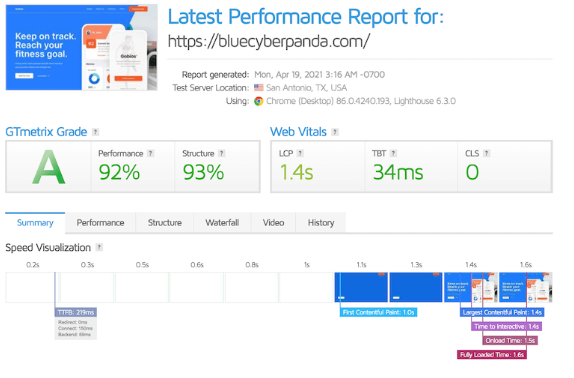
DreamHost is renowned for its high-performance hosting solutions. Here’s what you can expect:
- Speed: DreamHost invests in state-of-the-art hardware and data centers. They offer solid-state drives (SSDs) for all hosting plans, significantly boosting website loading speeds. This is crucial for retaining visitors and improving SEO.
- Uptime: DreamHost guarantees a 100% uptime. While no hosting provider can truly offer 100% uptime due to maintenance and unforeseen issues, DreamHost comes close, ensuring your website stays online.
- Scalability: DreamHost’s infrastructure allows for easy scalability. You can upgrade your hosting plan as your website grows without worrying about performance bottlenecks.
- Content Delivery Network (CDN): DreamHost offers a built-in CDN for faster content delivery, reducing loading times for visitors around the world.
Click here to learn more about DreamHost Performance.
HostGator Performance:
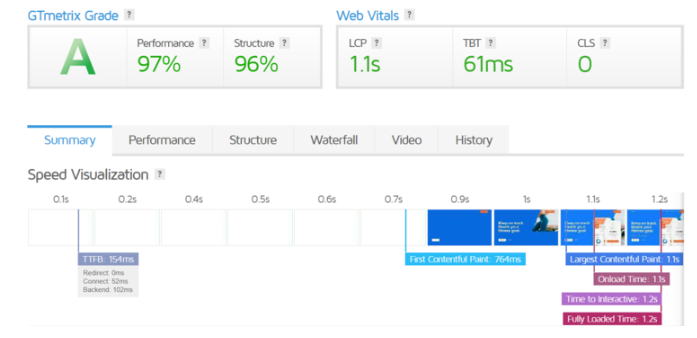
HostGator also strives to offer good performance, especially for budget-friendly hosting plans:
- Speed: HostGator’s speed can be decent, but it may not match the blazing-fast loading times of DreamHost’s SSD-powered hosting.
- Uptime: HostGator offers a 99.9% uptime guarantee, which is quite standard in the industry. While this is reliable, it doesn’t match DreamHost’s 100% uptime commitment.
- Scalability: HostGator allows for plan upgrades, but the shared hosting environment may have limitations in handling high-traffic or resource-intensive websites.
- CDN: HostGator offers integration with Cloudflare, a content delivery network, to enhance website performance.
Click here to learn more about HostGator performance.
Which Is Right for You?
In terms of performance, DreamHost tends to outshine HostGator, especially if you have a resource-demanding website or prioritize speed and uptime. However, HostGator’s performance is still decent, and it’s a viable choice for smaller websites on a budget.
Consider your website’s specific needs and long-term goals when making your decision. If top-tier performance is essential, DreamHost may be the better choice. For more budget-conscious users, HostGator’s performance might still meet your requirements.
DreamHost vs. HostGator: User-Friendliness
When it comes to web hosting, user-friendliness can be a crucial factor, especially if you’re new to website management. Let’s compare the user-friendliness of DreamHost and HostGator to help you decide which one is the right fit for you.
DreamHost User-Friendliness:
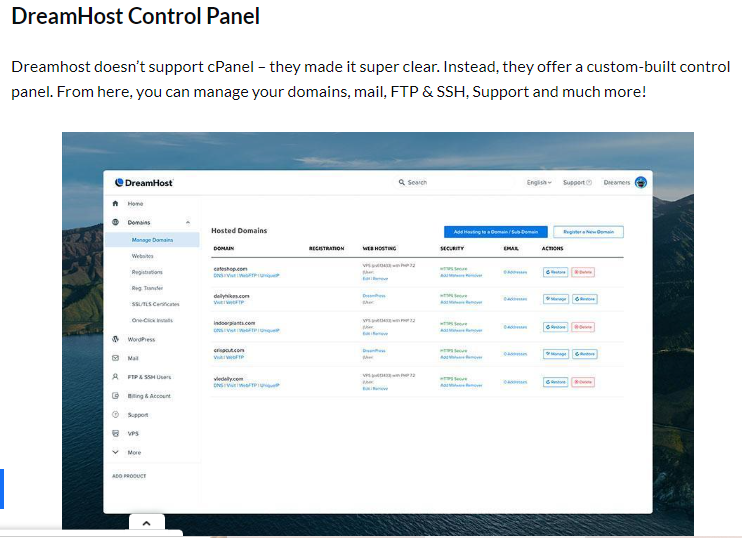
- Control Panel: DreamHost uses its custom control panel, which is straightforward and easy to navigate. While it may not be as universally recognized as cPanel, it’s designed to simplify the hosting experience.
- One-Click Installs: DreamHost offers one-click installs for popular applications, making it easy to set up your website, blog, or e-commerce platform.
- Website Builder: DreamHost includes a website builder with their shared hosting plans. This drag-and-drop tool is perfect for beginners looking to create a site without coding.
- WordPress Integration: If you’re a WordPress user, DreamHost provides seamless integration and pre-installed WordPress for a hassle-free experience.
HostGator User-Friendliness:
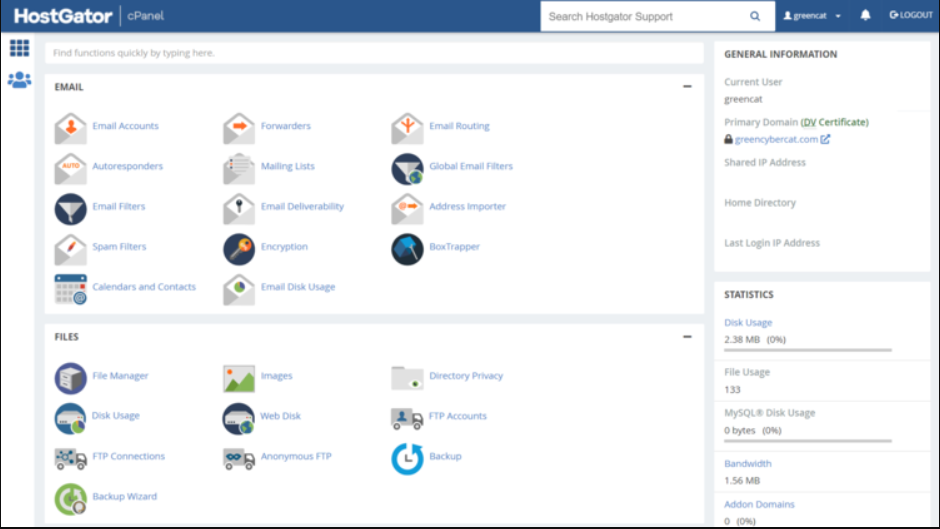
- cPanel: HostGator uses the industry-standard cPanel, known for its user-friendly interface. If you’ve used cPanel before, you’ll find it easy to manage your hosting.
- One-Click Installs: HostGator also offers one-click installations for popular applications, simplifying the setup process.
- Website Builder: Like DreamHost, HostGator provides a website builder with its plans, enabling beginners to create websites without technical expertise.
- WordPress Integration: HostGator is WordPress-friendly and offers quick WordPress installations, along with support for WordPress plugins.
Which Is Right for You?
In terms of user-friendliness, both DreamHost and HostGator have their advantages. If you prefer the familiarity of cPanel, HostGator might be the better choice. It’s also known for its user-friendly approach.
On the other hand, DreamHost’s custom control panel is designed to be intuitive and user-friendly, making it a solid choice for beginners. The inclusion of a website builder and seamless WordPress integration adds to its appeal.
Consider your own comfort level with hosting control panels and any specific features you need for your website. The best choice for you ultimately depends on your individual preferences and website management skills.
DreamHost vs. HostGator: Security Comparison
Security is a paramount concern for website owners. Protecting your digital assets, customer data, and online presence is non-negotiable. Let’s compare the security features of DreamHost and HostGator to help you make an informed choice.
DreamHost Security:
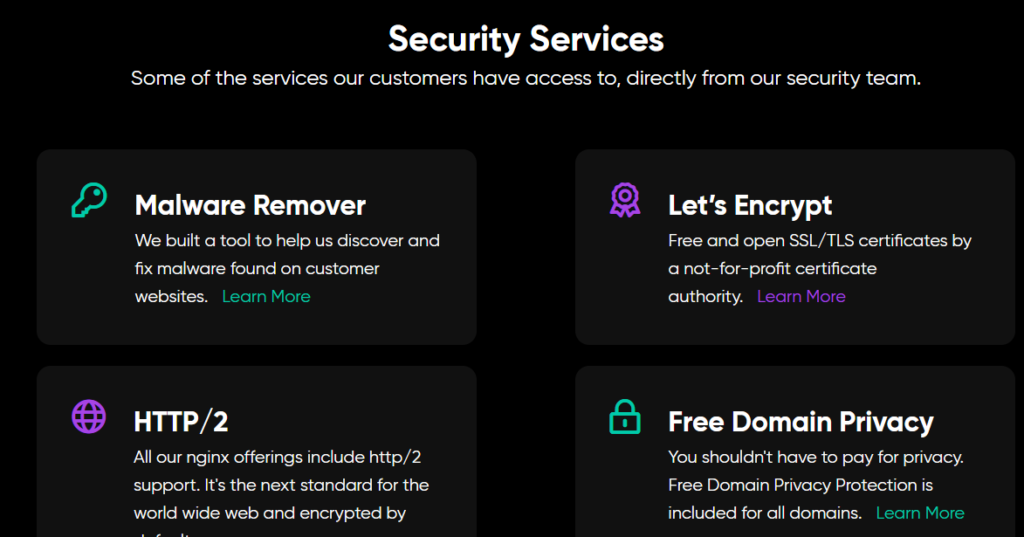
- SSL Certificates: DreamHost offers free SSL certificates with its hosting plans. This encryption protocol ensures data transferred between your website and visitors remains secure.
- Firewalls: DreamHost deploys robust firewalls to protect against malicious attacks, including DDoS attacks. This helps keep your website up and running even during cyber threats.
- Malware Scanning: DreamHost includes regular malware scans and automatic removal in its plans. This helps in identifying and addressing security threats promptly.
- Two-Factor Authentication (2FA): DreamHost provides 2FA as an added layer of security for your hosting account, making it harder for unauthorized individuals to gain access.
HostGator Security:
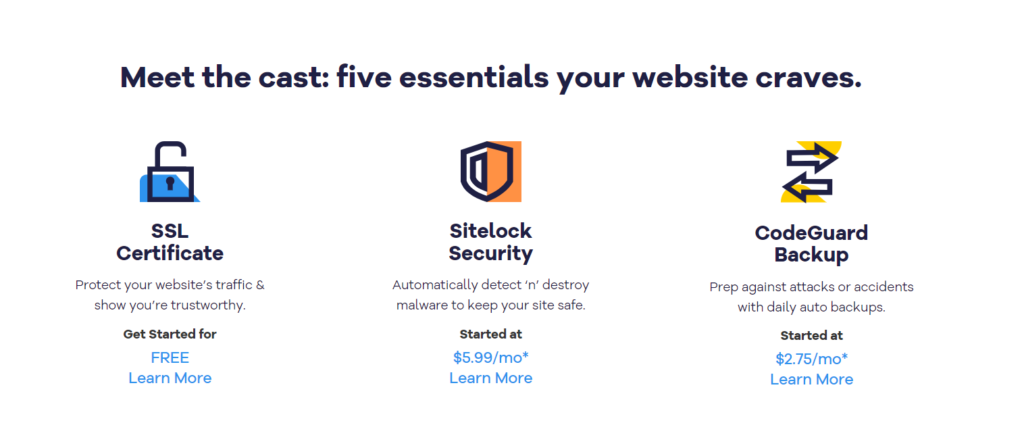
- SSL Certificates: HostGator also offers free SSL certificates to secure data transmission. It’s a standard feature across their plans.
- Firewalls: HostGator employs firewalls and security measures to protect against common threats. Their servers are monitored around the clock.
- Malware Scanning: HostGator performs regular malware scans to detect and remove threats. However, this service may not be as comprehensive as DreamHost’s.
- CodeGuard Backup: HostGator’s more premium plans include CodeGuard, a backup and recovery tool that helps protect your website data.
Which Is Right for You?
Both DreamHost and HostGator take security seriously. They offer essential security features like SSL certificates and firewalls to safeguard your website.
If you prioritize security and appreciate the added protection against malware and DDoS attacks, DreamHost may be your preferred choice. Their commitment to security is evident in their comprehensive security features.
HostGator, while offering solid security measures, is also a good option, especially for those who opt for their premium plans that include backup and recovery features.
When making your decision, consider the security features that align with your specific needs and the level of security you require for your website.
DreamHost vs. HostGator: Pros and Cons
When deciding between DreamHost and HostGator for your web hosting needs, it’s essential to weigh the pros and cons of each service. Let’s delve into the strengths and weaknesses of both to help you make an informed choice.
DreamHost Pros:
1. Performance Excellence: DreamHost boasts top-notch performance with SSD storage and a 100% uptime guarantee, making it ideal for high-traffic websites and businesses.
2. Strong Security: DreamHost offers robust security features, including free SSL certificates, firewalls, and malware scanning, to protect your website and data.
3. User-Friendly Control Panel: While different from cPanel, DreamHost’s custom control panel is designed to be user-friendly, and they offer a range of tools like a website builder.
4. WordPress Integration: If you’re a WordPress user, DreamHost makes WordPress management a breeze with seamless integration and pre-installed WordPress options.
5. Excellent Customer Support: DreamHost is known for its responsive and helpful customer support, offering assistance when you need it most.
DreamHost Cons:
1. Higher Cost: DreamHost’s premium features come at a cost, and their hosting plans may be relatively more expensive than some competitors.
2. Custom Control Panel: While user-friendly, some users may prefer the familiarity of the industry-standard cPanel.
HostGator Pros:
1. Budget-Friendly Plans: HostGator’s affordability makes it a popular choice for individuals and small businesses looking for cost-effective hosting.
2. User-Friendly cPanel: HostGator uses the widely recognized cPanel, which is easy to navigate and familiar to many users.
3. WordPress-Friendly: HostGator supports WordPress well, offering easy installations and plugin compatibility.
4. Good Uptime: HostGator provides a 99.9% uptime guarantee, ensuring your website stays accessible.
HostGator Cons:
1. Slower Performance: While adequate for basic websites, HostGator’s speed may not match the performance of DreamHost, especially for more demanding websites.
2. Limited Security Features: While HostGator offers essential security measures, it may not have the same comprehensive security options as DreamHost.
Conclusion:
Choosing between DreamHost and HostGator ultimately depends on your specific needs, priorities, and budget. DreamHost shines in performance and security, making it suitable for businesses and high-traffic websites. HostGator, on the other hand, is budget-friendly and user-friendly, making it a great choice for beginners and smaller websites.
Consider what matters most to you, and weigh the pros and cons to make an informed decision that aligns with your hosting requirements.
DreamHost vs. HostGator: Summary
Here’s a comparison table of DreamHost vs. HostGator:
| Feature | DreamHost | HostGator |
|---|---|---|
| Pricing | Variable pricing with premium features | Budget-friendly plans |
| Performance | Exceptional with SSD storage, 100% uptime guarantee | Adequate but may be slower for demanding sites |
| Security | Robust security with free SSL, firewalls, malware scanning | Basic security features with SSL |
| User-Friendliness | Custom control panel, user-friendly tools | cPanel for familiarity |
| WordPress Support | Seamless integration and pre-installed options | Good support for WordPress |
| Customer Support | Responsive and helpful | Decent support but may not be as responsive |
In the showdown between DreamHost and HostGator, DreamHost emerges as the superior choice for web hosting, and here’s why:
1. Exceptional Performance: DreamHost’s hosting services are engineered for high performance, thanks to SSD storage, a 100% uptime guarantee, and a content delivery network (CDN). This means faster loading times, better user experience, and improved search engine rankings.
2. Robust Security: DreamHost takes security seriously, offering comprehensive features such as free SSL certificates, firewalls, and malware scanning. Your website and data are well-protected against cyber threats.
3. User-Friendly Experience: DreamHost’s custom control panel is designed to be intuitive, while also offering a range of user-friendly tools, like a website builder and seamless WordPress integration. It’s perfect for both beginners and experienced users.
4. Stellar Customer Support: DreamHost is known for its responsive and helpful customer support, ensuring you have assistance when you need it most.
While HostGator is a cost-effective choice with its budget-friendly plans and user-friendly cPanel, it falls short in terms of performance and security when compared to DreamHost. For businesses, e-commerce websites, and those who demand top-tier performance and security, DreamHost is the clear winner. Its exceptional features make it the superior choice for a wide range of website hosting needs.

